Yes, I've been invited back to BBC Radio Coventry & Warwickshire tonight for another chat and to read some of my poems - a live programme again, something which always gets the adrenalin flowing! I was only up there a few weeks ago, so they must have liked me, I guess, or at least nobody complained! I'll be talking to Jane Vickers on the evening show, who's standing in for Anita Miah over the Christmas break.
The earlier weather forecasts were for snow tonight in the Midlands but they seemed to be sheepishly changing their tune on the six o'clock news, claiming that there 'might' be some snow in this area, but nothing like the bad drifts they'll be getting to the east and north of us.
But just in case the car gets stranded, I'm taking my husband with me and we should be back home for about 9.30-10pm, which will hopefully mean we'll miss the worst of the cold -- due to hit from about midnight onwards. Anyone in the Warwickshire area who feels like tuning in tonight, I should be on air from about 8-8.30pmish, maybe a little later. Let me know if you do manage to catch it!
Thursday, December 29, 2005
Wednesday, December 28, 2005
a cold shopping we had of it

Cold again this morning and more snow forecast. I had to drive into Rugby to buy copier paper - what we used to call 'typing paper'! - and sink into a latte whilst reading more Modern Women Poets; the journey was difficult but not impossible, the parking a nightmare as always at this time of year. Snow is beautiful, of course, but only for short periods. Here comes my anxiety attack again, continuing pollution of the atmosphere, land of the eternal snowscape, Mini Ice Age on the way ...
Tuesday, December 27, 2005
Deryn Rees-Jones’ MODERN WOMEN POETS: Mina Loy and the structure of poetry
I’ve been reading my way voraciously through Deryn Rees-Jones’ recent anthology of MODERN WOMEN POETS (Bloodaxe 2005) and making some fascinating discoveries about the history of women’s poetry over the last century. I would very much like to read the companion volume, CONSORTING WITH ANGELS: ESSAYS ON MODERN WOMEN POETS, also by Deryn Rees-Jones, but have only just ordered it from Bloodaxe and so will have to be content with the tantalisingly brief introductions to each poet in this anthology until it arrives.
The experimental poet Mina Loy (1882 - 1996) was born in London but later became a US citizen; the only two collections published during her lifetime were Lunar Baedecker (1923) and Lunar Baedecker & Time-tables (1958). Some of her comments on writing poetry - from an essay entitled ‘Modern Poetry’ quoted in the anthology’s introduction to her work - seem extremely astute and worth repeating here: 'The structure of all poetry is the movement that an active individuality makes in expressing itself. Poetic rhythm ... is the chart of a temperament.'
(Lost Lunar Baedeker, p. 157 - pub. posthumously in 1996/7.)
This makes supreme sense to me, for how else could poetry be constructed, except by way of reference to the self? Even the rules of formal verse are interpreted a different way by each practitioner. Free verse, by contrast, which has gradually become the standard in modern poetry since Loy herself first began writing at the turn of the century, has no precise set of rules, no absolute requirements before it can be called ‘poetry’. So how does the poet go about choosing a form in the face of such apparently unregulated freedom, unless he or she starts by looking within?
Mina Loy says - specifically to women writers in her ‘Feminist Manifesto’ - ‘Leave off looking to men to find out what you are not - seek within yourself to find out what you are.’
(Lost Lunar Baedeker, pp. 153-54)
Wise - if problematic - advice to women poets, now as then; we may well win praise and prizes for writing in a male idiom, but there’s too often an emptiness to the echo, a lack of self-investment in the work which eventually betrays it. How many male poets write like women? And what would we think of their work if they did? (I can hear the machine-guns being trundled out along the wall even as I write that ... )
Poetry may be ‘heightened speech’ but it is still very much an individual’s speech, the voice of that particular poet, not anyone else's. With that individuality comes eccentricity of theme and word selection; highly characteristic variations in line length; breaking the line at a certain word when another poet might have chosen to break after the following word, or perhaps the preceding one; choosing a particular title, or a number instead of a title, or no title at all; writing a prose-like narrative poem, or an elliptical modernist connotation of language and sound, or something more in the style of self-referential epigrammatic postmodernism.
In other words, we are all the sum of our parts, a combination of individual quirks, influences and past experiences, and blessed with a desire to experiment or consolidate, according to our nature as human beings. And that sum total - or as Mina Loy puts it, our ‘temperament’ - informs our every decision, from which hand is dominant to where we break the line in a poem.
For a comprehensive website devoted to this experimental modernist poet, featuring extracts from Mina Loy's poetry and writings, contemporaneous art and poetry that inspired her, and some unusual photographs - there was more than a streak of Victorian decadence in Ms Loy - visit this page first and then the home page of Jenifer Wolkowski's Mina Loy Website .
The experimental poet Mina Loy (1882 - 1996) was born in London but later became a US citizen; the only two collections published during her lifetime were Lunar Baedecker (1923) and Lunar Baedecker & Time-tables (1958). Some of her comments on writing poetry - from an essay entitled ‘Modern Poetry’ quoted in the anthology’s introduction to her work - seem extremely astute and worth repeating here: 'The structure of all poetry is the movement that an active individuality makes in expressing itself. Poetic rhythm ... is the chart of a temperament.'
(Lost Lunar Baedeker, p. 157 - pub. posthumously in 1996/7.)
This makes supreme sense to me, for how else could poetry be constructed, except by way of reference to the self? Even the rules of formal verse are interpreted a different way by each practitioner. Free verse, by contrast, which has gradually become the standard in modern poetry since Loy herself first began writing at the turn of the century, has no precise set of rules, no absolute requirements before it can be called ‘poetry’. So how does the poet go about choosing a form in the face of such apparently unregulated freedom, unless he or she starts by looking within?
Mina Loy says - specifically to women writers in her ‘Feminist Manifesto’ - ‘Leave off looking to men to find out what you are not - seek within yourself to find out what you are.’
(Lost Lunar Baedeker, pp. 153-54)
Wise - if problematic - advice to women poets, now as then; we may well win praise and prizes for writing in a male idiom, but there’s too often an emptiness to the echo, a lack of self-investment in the work which eventually betrays it. How many male poets write like women? And what would we think of their work if they did? (I can hear the machine-guns being trundled out along the wall even as I write that ... )
Poetry may be ‘heightened speech’ but it is still very much an individual’s speech, the voice of that particular poet, not anyone else's. With that individuality comes eccentricity of theme and word selection; highly characteristic variations in line length; breaking the line at a certain word when another poet might have chosen to break after the following word, or perhaps the preceding one; choosing a particular title, or a number instead of a title, or no title at all; writing a prose-like narrative poem, or an elliptical modernist connotation of language and sound, or something more in the style of self-referential epigrammatic postmodernism.
In other words, we are all the sum of our parts, a combination of individual quirks, influences and past experiences, and blessed with a desire to experiment or consolidate, according to our nature as human beings. And that sum total - or as Mina Loy puts it, our ‘temperament’ - informs our every decision, from which hand is dominant to where we break the line in a poem.
For a comprehensive website devoted to this experimental modernist poet, featuring extracts from Mina Loy's poetry and writings, contemporaneous art and poetry that inspired her, and some unusual photographs - there was more than a streak of Victorian decadence in Ms Loy - visit this page first and then the home page of Jenifer Wolkowski's Mina Loy Website .
Sunday, December 25, 2005
Friday, December 23, 2005
writing poetry
My apologies to those of you who periodically drop by, since I've been remiss in my posting for a few days. But it's good news, folks. I've been writing instead; writing poetry, that is, rather than prose, my more usual poison these past few years.
I started writing poems again after a long and difficult hiatus about two years ago, just after the birth of my fifth child, and although it was only a poem or so a month at that stage, it's now begun to snowball; poems are coming thick and fast, sometimes several a day, though of course not all are successful. But at least I have a far better idea these days of the sort of poetry I want to write and should be writing.
When I was writing this rapidly before, in the late nineties when I was putting my first collection together, and also in the year or so immediately following its publication, when four or five poems a day was not unusual, the ratio of throw-outs to must-keeps was much higher. Now I feel early on in a poem that it's not happening and either kill the whole thing without continuing, or write up what I've got and mark it as 'unfinished', just in case I want to work on it again later. And the standard of the poems I do finish is much higher. This is a blessed relief, believe me, because for some years after my first collection came out I was not able to put pen to paper at all - not to write poetry, that is. Hard to explain why, but I started suffering from a sort of poetaphobia. (Probably the wrong word - fear of poets rather than poetry itself! - but you get the general idea.) It sounds ridiculous now, but just the mention of poetry would make my palms sweat. I do still get nervous about poetry on occasion, for one reason or another, but not actually when I sit down to write!
So I'm extremely pleased to be writing again, and so fluently. I just hope it lasts! In the meantime, since I probably won't get a chance to post again before the day itself arrives, please do have a peaceful and merry Christmas, and for those of you who, like me, will be slaving over a vast family turkey and all the trimmings etc. on Christmas Day, do remember to enjoy yourselves ...
I started writing poems again after a long and difficult hiatus about two years ago, just after the birth of my fifth child, and although it was only a poem or so a month at that stage, it's now begun to snowball; poems are coming thick and fast, sometimes several a day, though of course not all are successful. But at least I have a far better idea these days of the sort of poetry I want to write and should be writing.
When I was writing this rapidly before, in the late nineties when I was putting my first collection together, and also in the year or so immediately following its publication, when four or five poems a day was not unusual, the ratio of throw-outs to must-keeps was much higher. Now I feel early on in a poem that it's not happening and either kill the whole thing without continuing, or write up what I've got and mark it as 'unfinished', just in case I want to work on it again later. And the standard of the poems I do finish is much higher. This is a blessed relief, believe me, because for some years after my first collection came out I was not able to put pen to paper at all - not to write poetry, that is. Hard to explain why, but I started suffering from a sort of poetaphobia. (Probably the wrong word - fear of poets rather than poetry itself! - but you get the general idea.) It sounds ridiculous now, but just the mention of poetry would make my palms sweat. I do still get nervous about poetry on occasion, for one reason or another, but not actually when I sit down to write!
So I'm extremely pleased to be writing again, and so fluently. I just hope it lasts! In the meantime, since I probably won't get a chance to post again before the day itself arrives, please do have a peaceful and merry Christmas, and for those of you who, like me, will be slaving over a vast family turkey and all the trimmings etc. on Christmas Day, do remember to enjoy yourselves ...
Monday, December 19, 2005
on angels and muscular poetry
Several days have passed since I last updated my blog ... and no surprise there, with Christmas-a-coming and five kids in the house! I was also struck down by one of these mystery bugs over the weekend and ended up sweating it out under a duvet on the sofa. Shades of being ten years old again and being allowed to watch telly for hours. Except now it’s the DVD collection of ANGEL I’m watching.
I only discovered BUFFY a couple of years back, having married a serious sci-fi/fantasy/horror fan, and now I have the pleasure of steadily watching my way through both BUFFY and ANGEL on DVD, courtesy of the incredibly good value home rental system on amazon. I find both highly entertaining. Especially when laid low and in desperate need of some eye-candy, as the Americans would put it. I’m referring, of course, to the sultry David Boreanaz, who plays Angel, the vampire with a soul.
So, I did my Fourcast reading at the Poetry Cafe last week and it went very well. I was nervous up until the last minute, then found it easy to slide back into performance mode. The poems I read were all new, i.e. uncollected, and some were so new they haven’t yet found their way into any magazines. I was very impressed by Martina Evans, Kevin Higgins and Jacob Sam-La Rose, the other poets reading with me that night, and it was good to see Roddy Lumsden again, who was hosting the event.
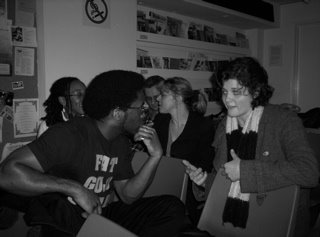
Jacob Sam-La Rose
My thanks to my husband Steve, who stoutly accompanied me down to London even though it meant he didn’t get to bed until nearly 3am and then had to get up for work again at 7am, and to my oldest and dearest friend Judy Ewart, who bought my train ticket, bless her, sat through the reading and then did something almost unheard-of at such events, and actually bought books by the other poets there. With hard cash!
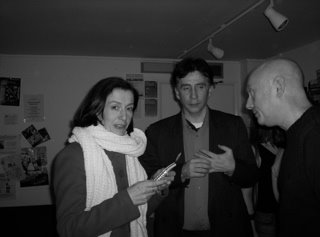
Martina Evans and Kevin Higgins (first from the left)
Yes, it was an enjoyable and fruitful evening; I’ve found that reading poems to an audience is essential for testing them on the air. Otherwise you’re only hearing the poems inside the space of your own head, or as a private exchange between yourself and maybe your partner or husband or cat, whoever happens to be listening when you first try them aloud, and it can be harder to spot glitches in the rhythm or words which don’t fit as perfectly as they should. So it was a useful exercise and I did take away some thoughts on possible structural changes to the more recent poems. I also noted which poems seemed to ‘grip’ the audience more than others.
To my mind, no sin in a writer is greater than that of boring the reader/listener. So it’s a relief to find a poem within your repertoire that, like a good and trusted friend, can be relied upon in almost all circumstances; a muscular sort of poem with broad shoulders and, even better, deep pockets.
I only discovered BUFFY a couple of years back, having married a serious sci-fi/fantasy/horror fan, and now I have the pleasure of steadily watching my way through both BUFFY and ANGEL on DVD, courtesy of the incredibly good value home rental system on amazon. I find both highly entertaining. Especially when laid low and in desperate need of some eye-candy, as the Americans would put it. I’m referring, of course, to the sultry David Boreanaz, who plays Angel, the vampire with a soul.
So, I did my Fourcast reading at the Poetry Cafe last week and it went very well. I was nervous up until the last minute, then found it easy to slide back into performance mode. The poems I read were all new, i.e. uncollected, and some were so new they haven’t yet found their way into any magazines. I was very impressed by Martina Evans, Kevin Higgins and Jacob Sam-La Rose, the other poets reading with me that night, and it was good to see Roddy Lumsden again, who was hosting the event.

Jacob Sam-La Rose
My thanks to my husband Steve, who stoutly accompanied me down to London even though it meant he didn’t get to bed until nearly 3am and then had to get up for work again at 7am, and to my oldest and dearest friend Judy Ewart, who bought my train ticket, bless her, sat through the reading and then did something almost unheard-of at such events, and actually bought books by the other poets there. With hard cash!

Martina Evans and Kevin Higgins (first from the left)
Yes, it was an enjoyable and fruitful evening; I’ve found that reading poems to an audience is essential for testing them on the air. Otherwise you’re only hearing the poems inside the space of your own head, or as a private exchange between yourself and maybe your partner or husband or cat, whoever happens to be listening when you first try them aloud, and it can be harder to spot glitches in the rhythm or words which don’t fit as perfectly as they should. So it was a useful exercise and I did take away some thoughts on possible structural changes to the more recent poems. I also noted which poems seemed to ‘grip’ the audience more than others.
To my mind, no sin in a writer is greater than that of boring the reader/listener. So it’s a relief to find a poem within your repertoire that, like a good and trusted friend, can be relied upon in almost all circumstances; a muscular sort of poem with broad shoulders and, even better, deep pockets.
Tuesday, December 13, 2005
Poetry Cafe reading this Thursday at 8pm
This is just a reminder that I'll be reading in London this Thursday from 8pm, at the Poetry Cafe, 22 Betterton Street, near Covent Garden.
Poets also on the 'menu' that evening will be Martina Evans, Jacob Sam-La Rose and Kevin Higgins. It's a fiver to get in, £4 concessions, with Roddy Lumsden hosting the event.
Poets also on the 'menu' that evening will be Martina Evans, Jacob Sam-La Rose and Kevin Higgins. It's a fiver to get in, £4 concessions, with Roddy Lumsden hosting the event.
Sunday, December 11, 2005
'Ratified': a poetry collection from the author of 'The Ropemaker's Daughter'
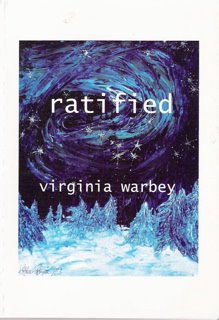
'The Alchemy of the Unexpected'
Novelist, poet and librarian Virginia Warbey died tragically young in a car crash in June 2004. Probably her best-known works are still her novels; The Ropemaker’s Daughter and The Carradine Diary, both published by Diva under her married name Virginia Smith, now modern classics of lesbian literary fiction. But a second collection of her poetry, entitled RATIFIED, has been published posthumously and when it came into my possession at the recent Torbay Poetry Festival, it took only a quick glance through its 80-odd pages to leave me determined to review it.
Poet Vicki Feaver has praised Warbey’s poetry, saying: ‘These are poems ... with a distinct voice and style: love poems that reinvent the love poem, ‘make it new’, as is the gifted poet’s task.’ I agree with this, and would add that it is Warbey’s ability to achieve such an intensely intimate tone in her love poems that makes her best pieces so memorable. One of the strongest instances of this is 'David and Bathsheba', a love poem that sidesteps the obvious problems attached to depicting such a well-known biblical couple, written with a rich attention to detail yet without sentimentality, seen with an artist’s eye and described with a poet’s ear:
'I was lost the first night I saw her,
kneeling at the courtyard pool, her skirts
gathered about her waist,
cypress oil threading gold across her breasts;
a web of want to hook the heart of a king.
She came when I summoned her.
She lay with me,
and the radiance that spilled into the space
between our bodies
dazzled into dust the yoke of our vacuous pasts'
Displaying an innate ability to ‘close’ a poem succinctly and with an echoing resonance that sticks in the mind long after the book has been closed, Warbey ends the poem:
'for we have tasted God on each other’s lips,
Bathsheba and I, sharp as poison.
We arise each day from a sleep like death,
and drink again.'
This is a collection redolent with such biblical keynotes, either quick passing references - ‘a little Lazarus, unsteady on his feet’, for instance, in a poem about a favourite cat who ran out of lives - or stories lifted whole from the scriptures and lived in, inhabited by the poet until they have been made ‘new’, as Feaver put it, reinvented in Warbey’s own voice and idiom.
'Cedarwood' is written in Joseph’s voice, the young carpenter tormented by the thought of his wife Mary’s pregnancy by another man, as he supposes:
'I watch you through the window as I work.
I watch you at the well and in your father’s house.
You stoop down and your blue skirts crumple against your skin,
sticking to your thighs in the fly-blown heat.
You lift yourself carefully these days.
The cedarwood grows warm beneath
my hands, begins to darken.'
Similarly, 'The Wedding at Cana' is seen through the eyes of a wedding guest, particularly astonished by Jesus’ transformation of the water into wine since he was ‘The man I’d barely noticed. / The one least likely.’ This, Warbey argues, is ‘what it’s like sometimes’ - 'the alchemy of the unexpected’ - where the one least likely to change your life is often the one who is most able to do so.
This note in her poetry, an easy conversational tone which nonetheless manages to maintain rhythm and tension, is what best characterises Warbey’s work. The voices change, may rise and fall, but they remain defiantly poetic, as here in 'Magdalen', where her ideologically provocative opening lines ‘If they tell you that it wasn’t love, / don’t believe them’ strike a colloquial note that are soon followed by the embarrassingly intimate and closely-observed
'I bathed his feet with the scent of tears,
touched my lips to the dust
that lived
in the veins of his ankles'
demonstrating why Virginia Warbey won no fewer than 13 competition prizes for poems in this second collection.
But perhaps that’s where I come to my only reservation about RATIFIED; too many of these pieces do read like competition poems. Well-written, yes, but perhaps a little too well-written and self-conscious to really lift the hairs on the back of the neck. Something deeper always seems to be being held back, smoothed over and planed down, hidden like Joseph’s frustration and jealousy in her poem 'Cedarwood'. Now and then it can be glimpsed, in the turn of a phrase or in a beautifully achieved image, almost ready to emerge but not quite, as though the poet is pacing herself, attempting to master the form that could contain her.
It’s a tragedy, of course, that Virginia Warbey will never be able to develop her work beyond this second collection, to transform herself into the accomplished and award-winning poet I have no doubt she would have become if she had lived. But what we do have in this promising second collection, RATIFIED, is a poetry worth turning to for its richness of imagery, its keen and questioning intelligence, and its strong rhythmic sensitivity; the poignant last snapshot of a talented poet, poised forever on the very brink of initiation.
........
To order a copy of RATIFIED by Virginia Warbey (Merdon Marque, December 2004) the price is £6.95, plus £1.00 UK post & packing. Send orders with cheques, made payable to Chandlers Ford Writers (VW poetry), to Claire Gradidge, 8 Forest Road, Hants, SO53 1LZ.
Alternatively, you can order online at amazon.co.uk
Wednesday, December 07, 2005
fine beards on display at the Night Blue Fruit poetry spot
It was the monthly Night Blue Fruit live poetry event last night and there was a packed house at the Tin Angel in Coventry. Pleasantly attended in the first half, elbow room only by the second half. Perhaps news had gone round that I was reading early. Jon Morley of the Heaventree Press kicked off the evening by reading a lively extract from David Dabydeen’s novel Our Lady of Demerara.
Hindu believe when you die you come back as ant, like me muma, or toucan like me dadee, or maybe a prince, a pandit, a pork-knocker, depending on whether Lord Krishna, who rule the universe, vex with you or content…
Heaventree Press published an extract from this novel in pamphlet form last year (entitled Jungle and available for £3.99 both from Heaventree Press itself and from Amazon).
Then we heard from Colin Dick, seen below, whose complex poems, command of the English language and fine Old Testament beard continue to astound and fascinate us all.
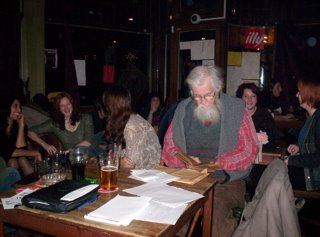
I read a handful of my own poems, talked to some interested parties about a possible Coventry Poetry Festival starting in 2007, and took these rather murky-looking photographs to capture the ambience. This is a young American poet, Deborah Adams, reading her poetry at the Tin Angel for the first time ... it can be a bit of a bear pit, but we took her innocence into consideration and were kind. I decided to post her photograph on here as a sort of odd-one-out situation; i.e. she didn't have a beard.
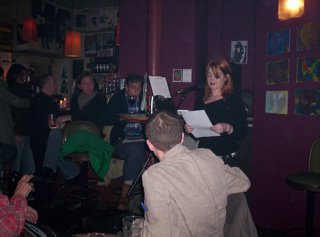
And here’s Barry Patterson, local poet and professional performer, putting in a quick plug for his newly published book, The Art of Conversation with the Genius Loci, which ‘looks at the relationship between our spiritual path and our immediate environment’ in a powerful combination of prose and poetry.
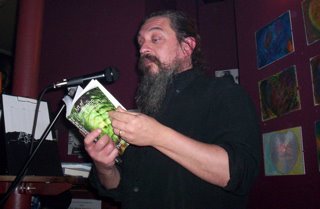
You can get hold of Barry Patterson’s book (£13.95) online from the publisher or by writing to
Capall Bann Publishing
Auton Farm
Milverton
Somerset TA4 1NE
And if all these beards and reading-your-own-poetry-to-an-audience craziness sound too exciting to miss, you can join Night Blue Fruit every month at the fabulous Tin Angel bar in Medieval Spon Street, Coventry, by clicking here for more details. You don't need to have a beard and it’s all free, except for the beer ...
Hindu believe when you die you come back as ant, like me muma, or toucan like me dadee, or maybe a prince, a pandit, a pork-knocker, depending on whether Lord Krishna, who rule the universe, vex with you or content…
Heaventree Press published an extract from this novel in pamphlet form last year (entitled Jungle and available for £3.99 both from Heaventree Press itself and from Amazon).
Then we heard from Colin Dick, seen below, whose complex poems, command of the English language and fine Old Testament beard continue to astound and fascinate us all.

I read a handful of my own poems, talked to some interested parties about a possible Coventry Poetry Festival starting in 2007, and took these rather murky-looking photographs to capture the ambience. This is a young American poet, Deborah Adams, reading her poetry at the Tin Angel for the first time ... it can be a bit of a bear pit, but we took her innocence into consideration and were kind. I decided to post her photograph on here as a sort of odd-one-out situation; i.e. she didn't have a beard.

And here’s Barry Patterson, local poet and professional performer, putting in a quick plug for his newly published book, The Art of Conversation with the Genius Loci, which ‘looks at the relationship between our spiritual path and our immediate environment’ in a powerful combination of prose and poetry.

You can get hold of Barry Patterson’s book (£13.95) online from the publisher or by writing to
Capall Bann Publishing
Auton Farm
Milverton
Somerset TA4 1NE
And if all these beards and reading-your-own-poetry-to-an-audience craziness sound too exciting to miss, you can join Night Blue Fruit every month at the fabulous Tin Angel bar in Medieval Spon Street, Coventry, by clicking here for more details. You don't need to have a beard and it’s all free, except for the beer ...
Sunday, December 04, 2005
Night Blue Fruit at the Tin Angel, 6th December
For those living in the Midlands, the next Night Blue Fruit live poetry event will be held this Tuesday, 6th December, at the highly atmospheric Tin Angel in Medieval Spon Street, Coventry. Hosted as always by Jon Morley of the Heaventree Press, the evening tends to kick off at about 8.30pm. Best to turn up a little earlier though to make sure of an open mic slot.
If you’ve never been before, it’s a lively and informal evening in a superb venue, well worth a visit if you’re into live poetry. Listen or join in, it’s entirely up to you. It's free, and there’s a fully licensed bar!
I’ll be at the Tin Angel this month too, reading some new work from 8.30pm onwards. Perhaps trying out some pieces I intend to read in London on Thursday 18th, at the Poetry Society Fourcast gig. And talking to people about the possibility of launching a Coventry Festival.
There seems to be such a strong poetic vibe in Coventry these days, with the Heaventree Press making strides with new and challenging publications, and our live poetry events always so packed out. It feels like time we thought about expanding our horizons and inaugurating an international poetry or literary festival in the city that would attract readers, performers, listeners and writers from all over the world.
If you’ve never been before, it’s a lively and informal evening in a superb venue, well worth a visit if you’re into live poetry. Listen or join in, it’s entirely up to you. It's free, and there’s a fully licensed bar!
I’ll be at the Tin Angel this month too, reading some new work from 8.30pm onwards. Perhaps trying out some pieces I intend to read in London on Thursday 18th, at the Poetry Society Fourcast gig. And talking to people about the possibility of launching a Coventry Festival.
There seems to be such a strong poetic vibe in Coventry these days, with the Heaventree Press making strides with new and challenging publications, and our live poetry events always so packed out. It feels like time we thought about expanding our horizons and inaugurating an international poetry or literary festival in the city that would attract readers, performers, listeners and writers from all over the world.
Subscribe to:
Posts (Atom)

